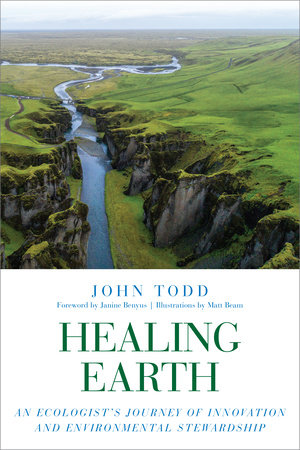rani wrote: thanks man. I went for 'cosmic grid' and it was a very dense read, and didn't make much sense as it referred very heavily to 'cosmic war' so I had to go back and read that.
unfortunately, I don't have an e-reader, so I can't make full use of that Avalon library, which is very disappointing. what format do you read in, usually?
I read on my phone using moon reader - it has a nifty thing for pdf that will convert & resize the text to be easy to read on a phone.
Yes his stuff is dense

A Precautionary Tale: How one small town banned pesticides, preserved its food heritage, and inspired a movement.
By Philip Ackerman-Leist (2017)
The main story of this book is about how Mals, a small region in the South Tyrol area, where Italy-Switzerland and Austria meet in Alps, has been able to stand up against the onslaught of pesticides and herbicides that plagued the region's apple orchards through a citizen-led referendum initiative (the famous RIC that the Yellow Vests are fighting for in France!).
Foodshed Democracy is the word that describes this book, and I couldn't be happier to read about it.

But to reduce the book to that would not be enough. In fact, the author Philip Ackerman brings his own story to the table, an American who has lived in the Vinschgau Valley for decades, working on the region's prized apple orchards.
What's incredible about this tale is how the situation turned from conventional agriculture and all that it entails (spraying of pesticides/herbicides/fungicides) to one where a shift in consciousness occurred. You'd think it's obvious, but in fact, when a region and its community depends almost entirely on one thing, Apples, not to mention old habits engrained since childhood, it takes a catalyst to switch course. That catalyst for the town, as explained in the book, were the few organic farmers who were concerned about the toxic sprays being carried by the valley's wind and unto their orchards, and hay. This wasn't just a threat to their organic certification (which their profits depended upon), but a threat to the well-being of the residents, and tourists.
Overall, I found this whole case so interesting because in that it gives a micro-perception that can be applied to the larger, macro-world, if that makes sense. It also depicts how much of a community depends on each individuals to thrive and evolve.
For instance, in the book is mentioned the town's veterinarian who was not only a former toxicologist, but an essential member that knows the towns people so well due to his career (family tradition of veterinarian for over two centuries!). He also sheds clues on how the toxic elements in the pesticides work synergistically with other toxic chemicals, in this case, to make it worse.
In other words, glyphosate is bad, but glyphosate + roundup + [...] makes it truly evil, and unknown, because things are only studied in labs individually, not compounded.
This eventually leads a fringe to take matters in their own hand by getting together and getting the word out to the community, eventually presenting a referendum initiative written by the "elites" of the town (doctors, veterinarians, lawyers, etc.).
Some aspects in the book that marked me:
"The freedom of the individual is limited by the rights of our neighbors."
I think that's a great way to draw a line in the sand for peaceful, and prosperous co-existence. It's applicable anywhere, really.
"Primum Non Nocere" from the Latin "First, do no harm". An oath that doctors used to take. I'm not sure why, but in a world where greed and blaming other people is rampant, it's refreshing to have a reminder of good leadership for the people.
The Precautionary Principle. If something casts enough doubts regarding safety concerns, even if the toxicity hasn't yet been proven, it should be stopped, and contained until further research, with a reversed onus on the perpetrator to prove safety, rather than the user/consumer/victims. This seems self-evident, but I look around in this world, and the truth is, it's not that evident.
Scientists could really use an oz of that wisdom..
"We must also remember to empower our movements with a positive perspective, always emphasizing what we are advocating for more than what we are fighting against. It's hard to say no to yes"
This also marked me. From my experience, and I think any THC can attest to this, it's easy to bitch against something we find repulsing, however noble the intentions behind them. But it's much harder to fight for a vision of the world we want. And that principle is the same whether you're casting spells (you need a visual of what you want to end up with) or behind a movement.
"Look after our little ones, and I have no fear of the Big Ones."
An advice from an elderly woman to Ulrich Veith, the mayor of Mals. This struck a chord with me, as I've started to notice that when one takes care of the smallest common denominator in a system, everything else naturally follows, as is beautifully illustrated in this piece of advice.
I found this book very well-written, the author paints a nice, intimate picture of a small, but tenacious community that ultimately rised above the archon paradigm, for a better future. Mind you, the referendum passed with 2/3 approval, that means cohabiting with 1/3 who are against you, and that is also a challenge. What this village did sets a precedent that other communities can emulate, and although it's looong, and harsh road ahead, I do have faith that we can slowly, but surely, take our food systems back, back to sovereignty by the people, and for the people.
The website of the publisher below, is a condensed version of the book, with pictures and all. Very well done.
https://www.thelexicon.org/toppling-goliath/

Burn: Using Fire to Cool The Earth
By Kathleen Draper and Albert Bates (Amazon US)
Five-stars
This book was up to my expectations, and learned a lot more about biochar and its numerous potential.
Kathleen Draper, who is also the director at the Ithaka Institute and a member of IBI (International Biochar Initiative), both incredible resources on the subject is able to present with Albert Bates, the current ecological context we are in, and how to achieve offset man-made CO2 by sequestering it with biochar, in parallel with replanting trees.
Although it gets quite technical at times with calculations and numbers (how much giga-ton of CO2 offset, etc.), it's easily digestable material, with lots of varied information to get an overview of the potential of biochar.

Biochar under microscope: All those pores make an effective sponge (and habitat for microbial life)
For those that are new, biochar is essentially charcoal made from many various sources of carbon, including but not limited to bio-waste such as: wood, tree branches and leaves, agricultural waste (husks, cobs), kitchen scraps, manure, sludge, etc.) or even things like plastics although those seem a bit trickier. The process that differentiates biochar from your BBQ grill is through a process called Pyrolysis, or burn in a low-oxygen environment. The result is not ash, but a solid chunk of black carbon. That stuff is black gold, and has many, many beneficial uses.
Too many to list them here, but one of my favourite is their sponge-like ability to absorb anything: Water, minerals, pathogens, and insulate heat, as well as EMF. It's quite common to have activated carbon filters for water filters (like Brita). So for instance, a biochar filter can be made to filter sewage water (or waste water from a production plant) it will then absorb and adsorb the minerals onto itself. Later, you can remove that biochar filter and now use it as a soil amendment, where all the nutrients sponged up will slowly be released for plants and soil organisms to feed on. For pathogens, it seems like they are de-activated (static charge?) so no concerns of spreading diseases that way.
One interesting pointed out, is that untreated biochar put on soil can suck in nutrients from plants and soil, thus decrease vigor for the first year or two. This is why it's necessary to treat the biochar with microbes and nutrients (which is where humanure or fermented tea, or previously treated water is useful)

Trees and plants love carbon, so they grow better, faster, stronger, and now you have more biowaste to use for further biochar production.
It's a cycle that keeps on giving, and what the author call, a carbon cascading effect.
In fact the biggest potential due to scale, is not as a soil amendment, but as a composite material in construction (concrete) as well as infrastructure (road making with asphalt) and as an industrial alloy (carbon fiber)
What I loved most about the book is it's larger vision, not just of using biochar, but of how the social-economic dynamics will shift along.
Currency projects, like the Nori, based on carbon-sequestrating initiatives (basically, you're paid the amount of carbon you've offset in the atmosphere) are interesting, and I wouldn't be surprised if soon, we'll have blockchain-based systems that tells you exactly where that char came from (what its made of). While still a gimmick, so were emails when first discovered, right? Time will tell!
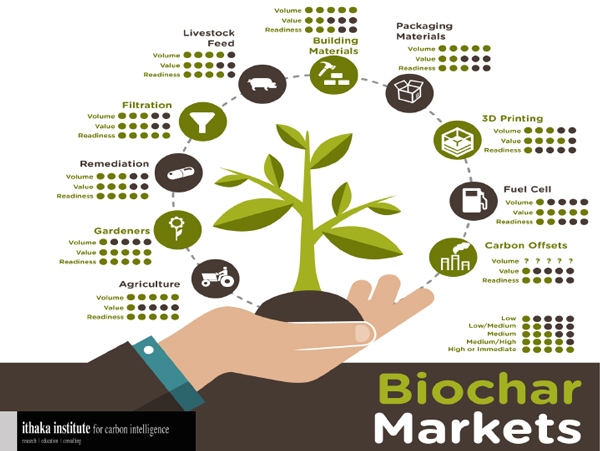
Circular Economies are/will flourish thanks to the ability of DIY and/or accessible kilns (oven/stoves) that will enable local waste to be turned into biochar for many uses. I don't think I'm qualified to talk about the stove setups specifically, but to mention only one aspect: Stoves not only turn waste into biochar, but while doing so, the heat output can be used to heat buildings or hot water; energy can be turned into electricity; While there are CO2 and Syngas (synthetic gas) emissions from it, that can also be offset by the growing of algaes (seaweed).
This is partly what the City of Stockholm, Sweden, has decided to do with its parks waste. I hope a lot more will follow this example.
In fact, there's a great case to be made where Biochar, in tandem with algae can really close the loop, while producing abundant nutritious food.
Another one:
Bamboo grows super fast, and it's strong and durable.
How about growing bamboo, using clippings for biochar, while it can be used as building material for geodesic domes (habitats; gardens..). Kathleen also mentions her project using bamboo and biochar for compostable diapers (diapers again, from previous post) for her dog, though leaves out the "how".
Around me, and in general, I noticed how many small, local farmers in BC are strangled to earning any profits, working their asses off non-stop. But also noticed they don't necessarily consider the waste as a precious resource. At best, they would compost it (a waste in my opinion). Instead, turning your waste to grow mycelium and/or biochar is literally, the alchemical transmutation of poo into (black) gold.
But I'm already getting way too far into the bushes.
The book is highly recommended, and while I don't think it's a silver bullet for all our problems, combined with other platform technologies, like water vortexing and mycelium, biochar may be one of the most versatile, best ways for eco-entrepreneurs to start a co-operative venture not to mention the relative low-initial capital investment required. Very inspiring stuff.
If you can't get the book but are interested, do check out Ithaka-Journal and IBI (links below), or Youtube for many videos on how to make your own biochar.
Oh and one last synchronicity before I leave, the book was dedicated to Hans Peter-Schmidt, and Gunter Pauli! Going full-circle.
The future is/will be open-source; (networked) local, and symbiotic.

PS: this may sound foolish after talking so much about this, but perhaps the biggest learning lesson for me was the carbonizing process itself. Something as simple as match-stick burning I took for granted my whole life, is actually very insightful (it's the ejected gas burning; not the wood per se).
Fire, like Water, Soil, and Air, is an area I am only beginning to wake up to.
Banzai!
Ithaka Journal:
http://www.ithaka-journal.net/?lang=en
International Biochar Initiative:
https://biochar-international.org
Open-Source Biochar Stoves (Courtesy of IBI):
https://biochar-international.org/open-source-biochar-technologies/
32pages Guidelines for development and testing of pyrolysis plants
https://www.youtube.com/watch?v=DY8rIWtaLd8
PS: This link is written by Albert Bates, it's referenced in the book, but it's people-driven project in Dominican Republic using biochar as a pillar for a regenerative culture. Inspiring stuff.
https://medium.com/@albertbates/the-cool-alternative-to-climate-apocalypse-5ad6fc15ceb2
Also very interested in the work of WorldStove, making cheap, easily-DIY'd cooking biochar stoves for home use. The only part that needs manufacturing is the vortex-spiraling top that allegedly mixes nutrients more effectively (makes me wonder if its the air equivalent of water vortexing?)
Eat Like A Fish: My adventures as a fisherman turned restorative ocean farmer
By Bren Smith (2019)
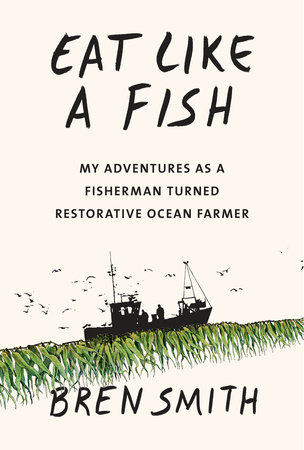
5-Stars
Came upon this book after Gunter Pauli talk on 3D Ocean Farming. Turns out Bren Smith is a/the pioneer in the field, and like any mavericks who digs his way through, it’s an incredible homeric tale of a fisherman turned aquaculture farmer, before settling to being an ocean steward growing seaweeds/seafood while regenerating the ocean (and land) ecology.
Bren Smith, originally from Newfoundland, technically a Canadian province, but I discovered thru the book that they really have their own distinct culture.
The first half of the book is an autobiography of a guy you’d never expect to hear from. And yet he delivers such a compelling and warming story of trial and tribulations, as well a tale of awakening and the search for meaning in Life.
The second half is a manifesto packed with information regarding ocean farming, ecology of seaweeds and their widespread benefits. Seaweeds like Kelp offer nutritional benefits, as well as for feed, natural fertilizer for soil agriculture, and most importantly, act as potent water filter that thrives on carbon out of water/air, and filters the nitrogen in the water (a problem especially with land-based agriculture affluents leaching in oceans)
Even better yet, it needs no input: no fertilizer, no freshwater and very low maintenance. Following Masanobu Fukuoka’s principles, this is the “lazy” man’s farming at its pinacle.
According to Smith, what you need is the following:
- A water “land” lease to operate your farm (the water doesn’t belong to you, only the farm processing, hence why its cheap). In the US, they cost $15/acre per year.
- a boat (costs
- $10,000-$20,000 for buying necessary equipment like lines, buoys, cages.
The return per year according to Smith are from 90,000-$120,000 per year. While I’m sure these stats are just that, they give a clue as to what to expect. Kelp is also year-around crop, and polycultures keep things rotating.
I won’t go into the details of where/how to do it. But if you’re interested, check the book, or the GreenWave website.
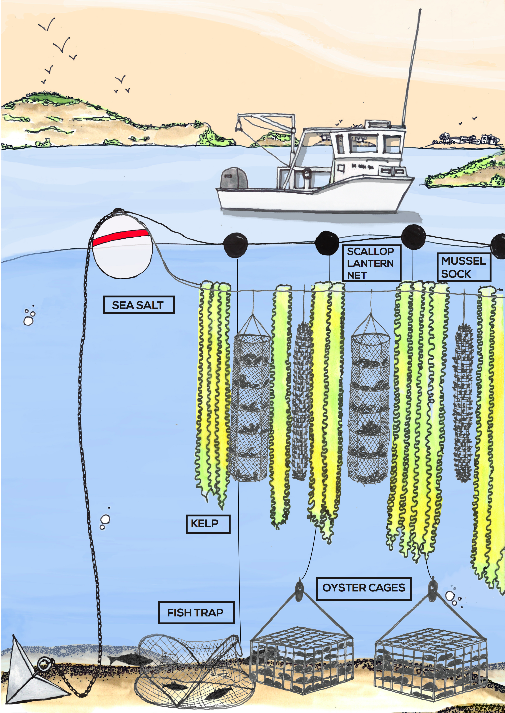
The name comes from the fact that fish get their omega-3 fats and all the goodies from eating kelp and seaweeds. And so should we, instead of blindly chasing endless supply of fish farmed in aquacultures in conditions analog to industrial cattle-farms.
Personally, I’ve always loved seaweed, but kelp noodles, and kelp in bread? That’s cool, and I like his attempt at de-sushifying seaweed.
Mind you, it’s not all about kelp. There are also oysters, mussels, scallops as well at different depths. His ethos is based on biodiversity of crops, as well as farms. Meaning it’s much more efficient, and easy to have 10x 20 acre farms than one 200 acre farms.
Bren Smith shares the down and ups of his life, but more importantly, even after his Thimble Island farm success in Connecticut, he went through this period where everyone was jumping to interview him, a poster child with the slogan “Kelp is the new Kale”.
Interestingly enough, perhaps thru his wife’s connection with Yale University, he’s been invited at the Clinton’s Global Initiative (one memory he shared was how no-one had bothered to check the knife he had in his bag while being handed the award by Clinton, lol!). This included shark-investor from Wall St chasing him with offers, and eventually ending up being scammed by such guys.
Love it. Because it’s one thing to stumble upon something game-changing (Wardenclyffe) but it’s another to know how to market it and getting the word out without being swallows hole by greed.
The oyster of this book to me is at the end, describing the creation of GreenWave, an organization committed to sharing all this material open-sourced, with a clear vision for regenerative farming, and to really spread this so that almost anybody can get into this if they want to. His vision isn’t for it to sustain the current shark-capitalism model, but to harbour a new model, based on Co-ooperation (rather than competition), where the oceans and its bounty are for the Commons and should be cared as such. It mentions John Fullerton’s white-paper on Regenerative Capitalism, and whole I haven’t read the paper yet, it sounds similar to Blue Economy ethos.
There are tons of gems in the book.
One was that kelp contains enzymes that when consumed, substantially decrease flatulence in cows, on the order of 60-90%! That much methane reduced means tons of potent greenhouse gas cut.
Another was that McDonalds temporarily had a seaweed based burger in the 90’s. Who woulda thought?

It’s a great book, and really inspiring tale.
I don’t know if I’ll go that way just yet, but its low initial capital costs, relative ease and regenerative ecosystem, as well as versatility of crop uses (food; fertilizer; material for polymers; biofuel to name just a few) makes it a very attractive offer if you live near the seas.
I’ve been wanting to post about the Future of Work on here for a while, but I couldn’t settle down on a topic. I feel like this book brought me inspiration for discovering meaning in work while also working in harmony with Nature.
This win-win-win scenario is what will spark the new utopian paradigm of healing what we messed up, and thriving with Gaia.


https://www.amazon.ca/Holy-Shit-Managing-Manure-Mankind/dp/1603582517
https://www.amazon.ca/Humanure-Handbook-Guide-Composting-Manure/dp/0964425831
A good book on manure management which I enjoyed, Holy Shit by Gene Logsdon describes the benefits of animal (and even humanure) manure as a potent soil amendment in farms that can be added to soil around growing food plants, as well as shedding the light on various types of animals such as horses, cows, pigs, goats, sheeps, hens and roosters, ducks, geese, etc.
You can imagine the differences between a cow pie and goats dark pebbles, or bird guano type, or even animals/human ones.
He’s born a farmer, and it shows. He has a great enthusiasm for showing how simply by using what we already have, and using it to make manure packs, instead of flushing it all away and ending up wirn getting some by-product methane.
It’s also a natural fertiliser for plants with which farmers don’t need to be dependent on commercial fertilizer and its long-term effects on soil.
Still, we could be saving tons of water by storing the manure using dry beddings, usually made of straws of various types of grains, and a combination of small biochar powder to absorb smells and pathogens while soaking all the microorganisms and nutrients.
As well as other things.
He calls this forked, layered mound the manure pack as it was once widely practiced.

https://smallfarms.cornell.edu/2012/01/09/consider-deep-pack-barns-for-cow-comfort-and-manure-management-2/
One of the things I love hearing which Gunter Pauli talks about as well, was how pigs in particular, but surely others too, can be potty-trained relatively easily, so as to reduce labour and improve sanitary conditions, while adding on to the manure pack.
Last but not least, the topic of terra preta and biochar was briefly mentioned, but the plight of human waste flushing down gallons, including pills that make trans-frogs as well as toxic chemicals.
Funny enough, the book next to it at the library was Humanure Handbook by Joseph Jenkins, and sure enough, it was mentioned as a resource in Holy Shit.
It deserves its own post, but suffice to say, it starts off by comparing the dynamics of catching a fever (rise in temperature) due to microbial infection, to what Mother Earth is going through due to our undoing. It makes total intuitive sense, and I like what I’m seeing there.
I guess you could say I like shit:cool::D
PS: Before you go and try it, I’d like to disencourage improvisations on this one. Plan ahead.
Sowing Seeds In The Desert
By Masanobu Fukuoka (2012)
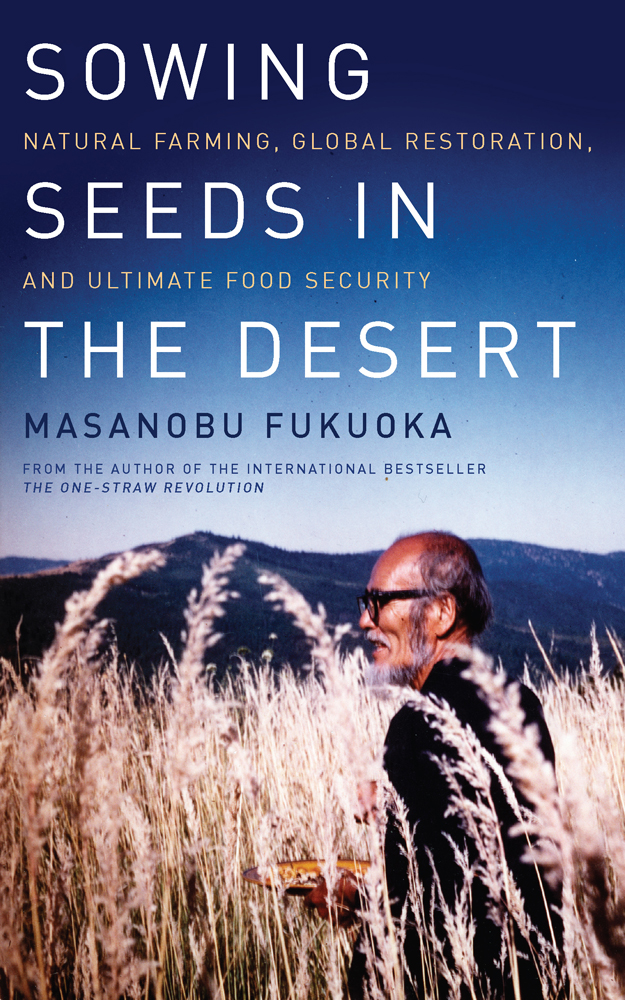
5-stars
After having read One-Straw Revolution earlier, I have become fascinated with what Fukuoka-san calls green manure: nitrogen-fixing “weeds” like white clover or alfalfa. After much daily, random observations in the environment, I noticed how where there is clover, the grass is greener, and various types of mushrooms are also present. This is just one detail that changed my views since reading his seminal book.
This one is his last major work before his passing, and in a way, weaves together his philosophy as a central pillar, where natural farming becomes an extension (rather than the sole focus).
In this way, Fukuoka-san describes his experiences abroad, in the US, India, Thailand, Ethiophia, Somalia and other places, often to regenerate the harsh deserts found in those places.
His anecdotes of refugee camps in Africa, where he brought seeds for people to grow food, and where children where the first to start growing veggies in camps and elders followed, are impressive and heart-warming.
Not only for the obvious reasons, but also because in many African countries (and others with a legacy of colonialism) it is/was either culturally inappropriate to interact with farmers (considered lower-class) or downright forbidden to spread any ideas that would make them self-sustainable. Wow!
His observations on modern irrigation systems from rivers that totally mess up the flow of water (thru things like dams), to water fields which dry up and leave so much salt as to kill the soil. Instead, he proposes to start regenerate forests, along from the river outwards. As always, covering the soil with clovers or other weeds to give shade for other plants to grow, as well as fence (or natural poisonous plants) to repel goats that could graze on the young trees and vegetation.
I really can’t do justice to the book, but the notion of Mu (emptiness) which can be summed up as let Nature do its thing, and you be her steward (instead of using her to grow food for you).
This is the Regenerative Agriculture Manifesto that is right on time. The USA, especially, as cited in the book, has more and more deserts due to the destruction of soil (and pumping/emptying aquifers).
I used to blame geo-engineering for extreme weather patterns, but now I wonder if its not those deserts that actually foster droughts, and half water-cycles (where rainwater doesn’t seep in to the hot soil; instead runs off top-soil and inundations/landslides occur). I’m beginning to understand how important trees are for the soil, not just as a facilitator and mentor for other plants, but also as a water fountain (and to bring rain), as well creating shade and winds, as well as habitats for numerous animals.
The biggest, most potent weapon for mass vegetation is the clay pellet seed ball that’s now become mainstream with guerilla seed bombing: mix in all types of seeds, fungi, bacteria. One of the things they did in India under Fukuoka-san’s supervision was using airplanes to drop seed bombs pellets onto arid deserts to revegetate vast areas in little time.
This gives me much hope, for it means that we have all we need; just the political will missing.
This book is highly recommended even if you don’t have much knowledge about gardening. It’s more philosophy than practical, even though it contains appendixes with guidance.
1)
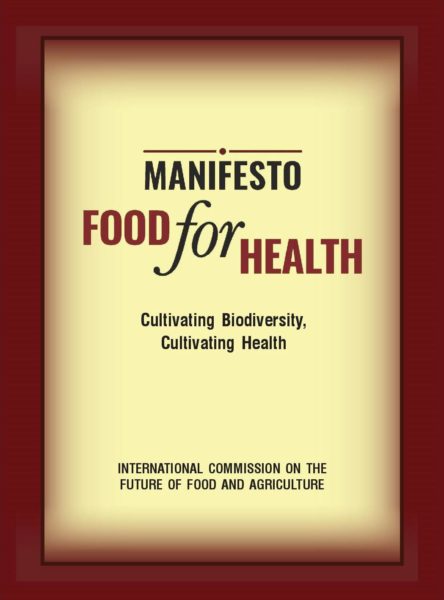
(Available for free on Navdanya)
This one comes courtesy of Navdanya (Nine Seeds), the organization founded by Vandana Shiva. As a physicist, environmental and social activist, as well as author of many books, this manifesto describes everything that is detrimental about the modern chemical-food agro-industry, and makes the case for a new holistic food paradigm that puts the human being, environment and ethics at the forefront.
I read this on my long-haul flight, and it dawned on me that agro-ecology encompasses more than just growing healthy food: it's about taking care of soil, water, air and the trillions of organisms which make up the Living System: from the micro to the macro with humans somehwere in between.
Business structures will also have to shift from linear, external Agro-Chemical inputs to, circular or cradle-to-cradle initiatives, based on equity and dignity for farmers, consumers and the Planet. The book does a great job at addressing issues like microbial resistance; dangers of seed patenting and the importance of biodiversity and the link with gut flora and inflammatory diseases (including multi-generational DNA damage)
When I hear people talk about the imminent threat of over-population, I can't help but shrug with pessimism. Not to say that 7.5 Bn of us isn't many. However, I am more than convinced that if we shift from top-down pyramidal agriculture to bottom-up, decentralized food orchards in communities, there will be more than enough to feed everyone while regenerating the lands.
Highly recommended read, one that I hope will inspire others as well.
2) One Eye In The Land of the Blind: Based on the Life of Viktor Schauberger
Although I talked about this book a couple months ago, I never finished it (and still haven't).
With my jet-lagged insomnia, I decided to resume the book last night. And boy, it can't be emphasized how incredible and mind-blowing this book is. It's like a compedium of esoteric aether science written in a novel form, as if you were next to Viktor Schauberger as he is trying to uncover the mystery of the Trout Force.
For those unfamiliar, this is referring to how trouts swim against the stream thanks to a combination of factors, all revolving around the vortexing of water.
I'm not doing justice to the incredible investigative work done by the author, digging up information on John W. Keely, Blavalsky, Rudolf Steiner, Nikola Tesla, and many new names of German aether scientists I had never heard of, such as Karl Schappeller, or Edward Bulwer-Lytton (and his book, The Coming Race): all contemporaries of Keely, Tesla, as well secret brotherhoods like the Vril Society.
Not only that, it does an incredible job at putting the esoteric concepts of Schauberger's male-female energies (like Male Sun/Female Earth) as well oxygen-carbon dynamics. In fact, I find it to be a great holistic primer to VS's original books.
How authentic it is goes beyond me, but it is very well documented and written to capture your mind at every page. Most of it I can only grok on an intuitive level, but it had me read until sunrise.
Interesting anecdote, last time I shared about this book, I wanted to upload the book, when my laptop’s morherboard died on me, an ordeal that took me two months to repair.
So forgive me if I feel a little superstitious about sharing it this time. Interestingly, in the story many passages relate to the powerful omens around aether science due to its binary potentially devastating effects (Atlantis), or as salvation for mankind (shamballah).
Suffice to say, it's a book imbued with magickal powers.
8/24 edit: here’s a review of the books content better than I could ever write:
https://www.vamzzz.com/blog/free-energy-viktor-schauberger/
9/1 Edit: Here's my review of this incredible book.
https://quieteccentric.wordpress.com/2019/09/01/one-eye-in-the-land-of-the-blind-the-rediscovery-of-aether-by-reinout-guepin-book-review/
Is anyone reading Edward Snowden’s memoir, Permanent Record? I’ve been reading it for a few days, barely over a third of the book.
It’s incredible. His perspective sheds a lot of light on things, I’d always harboured my suspicions on him, but it’s well written book, and very fitting to the times we’’re living.
I won’t spoil much for now (keepin it for the review later 😉 ) but I’ve uploaded the ebook, for sharing is caring.
Enjoy!
https://mega.nz/#F!f8IzESqK!ByeWWmjJKZqbR_bgkBAh3g
PS: the US Gov is already suing him ans his publisher for violating his NDAs, and intend to get every dollar from booksales.. lowlife lizards I tell you..
Book review by Global Coral Reef Alliance (2019)
Just started reading a book I bought recently called, Healing Earth by a guy name John Todd, who's a well-respected elder and an ecosystem restoration pioneer having worked on many different projects around the world. It's a fascinating book, and a wealth of wisdom about the Ecosystem-thinking. With a foreword by Janine Benyus (Biomimicry pioneer) 😉
Feel free to have a look at it (Uploaded on my MEGA server):
https://mega.nz/#F!65hxEADS!CgkMUWFqN-mqQL0GsoRN8g
PS: The word he coined, Geotherapist sounds exactly like what I want to do!

Notre Cause Commune: Instituer Nous-Memes La Puissance Politique Qui Nous Manque [roughly translating as: Our Common Cause: To institue ourselves the political power that is missing]
Author: Etienne Chouard (Max Milo, 2019)
5-stars: Etienne Chouard gives a run-down of why the current form of governance in France (and elsewhere) is fundamentally flawed and anti-democratic. Instead, as the Gilets Jaunes (aka Yellow Vests) have been doing since day one, presenting the tools to re-adapting our institutions to serve, and not command, for the benefit of the Common Good [Commons].
While the book is in French, and sadly no English translations available yet, the content described herein is a universal tool for emancipation worldwide. With a background as a professor of Law and Economics, but also a tireless activist since 2005 for the institution of a RIC, Citizen's Initiative Referendum in English, Chouard is probably one of the most coherent, grounded and humanistic thinkers I've come across in France yet.
The arc of this book is quite interesting:
1) Starts with how the 1789 French Constitution is in fact anti-democratic, and the ensuing form of Representative Government, where people elect politicians to take actions on their behalf, is inherently aristocratic, and incompatible with taking care of the well-being of the Common Good. Put simply, elections regress the citizen to the base category of mere electors. Once you've abdicated your citizen's rights to self-sovereignty to a politician: You've become, at best, mere servants to the masters.
"Elections give power to those who seek it (random selection, doesn't)"
"[Process of] Election incites lying and favours lyers (random selection doesn't)"
2) The solution to this flaw: random selectioning of representants. This seems counter-intuitive at first, but Chouard describes quite elegantly, why and how this mode of selecting politicians will:
a) prevent/disables the ascension of corrupt, lying crooks in positions of power because no more elections where only the most powerful can afford to have a platform
b) Increases burden of responsibility in the candidates to perform well when given the chance. Also, dissuades lying, since lying won't benefit in accessing the reigns (as is currently the case with elections format, where politicians can get away breaking campaign promises)
c) Guarantees a constant sample size representative of the Whole citizenry: A random selection will always result in at least 50% of women; 90% working-class and 10% unemployed.
However, not to throw the baby with the bathwater, Chouard makes a wise case for the use of Representative format, only in the context of municipal level (city/town) elections, since those candidates are more likely to be figures you can interact face-to-face (unlike larger, State, or Federal-level candidates).
3) Last but not least, the Golden Goose of this book, and the one demand that can rule all other demands: the Citizen's Initiative Referendum (RIC). Why? Because it shifts from "what law you want" to "How we want our laws to be enacted, by Us
This is precisely the main demand that the Gilets Jaunes in France have been rallying since the beginning, and arguably, the point that the Powers-that-be are most afraid of, since it would completely shift the balance of powers.
Reading this book made me reflect on the benefits of random-selection for positions of power. I wondered how for instance, even in a forum like this, if Plus members would be picked to moderate a forum, what the outcomes would be. Common examples I'm aware of, where we already use this type of process 1) Jury selection 2) Hunting licenses (where a pre-determined number hunting licenses will be randomly chosen and given to participants, for the hunting of an animal, in a given area, for that season).
As far as I know, in those two areas, they offer the most fair decision-process. So it seems to me that it would a good idea to extend to the political arena.
On the other hand, this books opened my eyes to sages of yesterday, folks like Aristotle, Simon Weile (Oppression and Liberty), Montesquieu, Jean-Paul Marat (Chains of Slavery) and others, who have written so eloquently and with such conviction about the flaws of the political systems of their times (which our current institutions originate from). Quite frankly, I'm quite the ignoramus in this context, so I shall be checking their writings soon, hopefully.
The book is available on my Gaian Library link, along with those resources just mentioned. Feel free to download, and share.
Cheers, and vive l'Evolution!

Jean-Paul Marat murdered in his bath-tub, by Jerome Martin Langlois, 1793
Let us not forget the price some have paid for seeking and sharing the truth.
Hey Folks,
Gunter Pauli often mentions the 7 laws of Physics that scientists seem to ignore. Being a self-proclaimed Knight of Malta, I assume he is referring to the 7 hermetic principles?
Having never yet read a book about Hermes Trismegistus, is there a particular book/edition you would recommend for newbies (I know, late to the game..)? I will start by checking the Kybalion (by The Three Initiates). If you have others, please let me know. Thanks 🙂
enjoypolo wrote: Hey Folks,
Gunter Pauli often mentions the 7 laws of Physics that scientists seem to ignore. Being a self-proclaimed Knight of Malta, I assume he is referring to the 7 hermetic principles?
Having never yet read a book about Hermes Trismegistus, is there a particular book/edition you would recommend for newbies (I know, late to the game..)? I will start by checking the Kybalion (by The Three Initiates). If you have others, please let me know. Thanks 🙂
Way of Hermes - Corpus Hermeticum
https://drive.google.com/open?id=0B8sVGWf8eeQ9SndYSHpoSXVKNzA
Its in this folder with a bunch of other stuff
nickzeptepi wrote: Way of Hermes - Corpus Hermeticum
https://drive.google.com/open?id=0B8sVGWf8eeQ9SndYSHpoSXVKNzA
Its in this folder with a bunch of other stuff
You’re the man, @nickzeptepi. Thanks a lot for this treasure trove of a library!
enjoypolo wrote: You’re the man, @nickzeptepi. Thanks a lot for this treasure trove of a library!
I just uploaded a few more
Including the kybalion. & A few other theosophy books.
Try the yogi philosophy books they are by the same authors.
So it's the holiday periods, and boy do I have packed reading list. So in the spirit of sharing, here are some great sites for your ebook needs:
Happy Holidays Everyone;)
- 44 Forums
- 3,789 Topics
- 16.6 K Posts
- 1 Online
- 24.2 K Members

